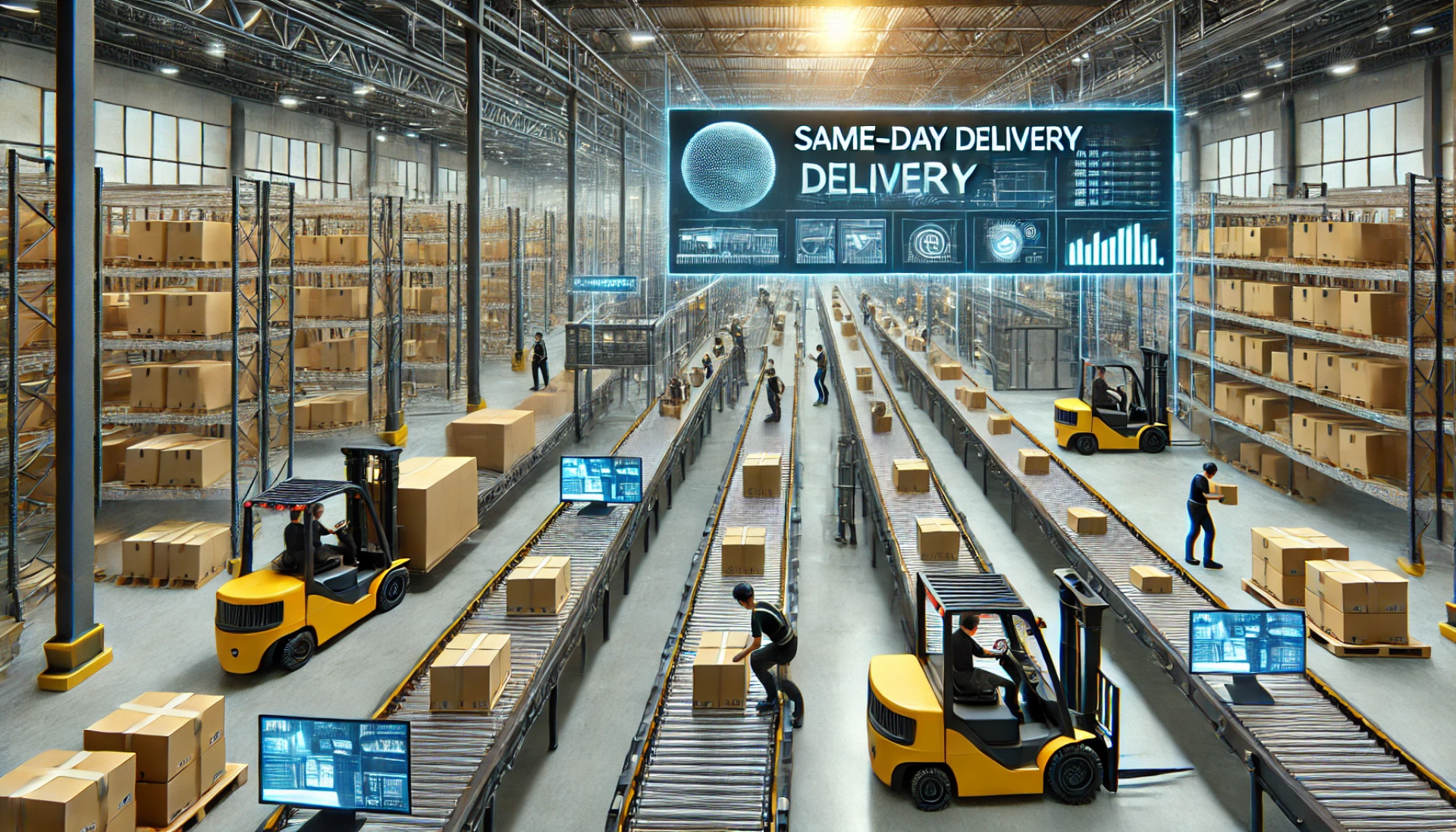Peterborough: 01733 802300
Huntingdon:
01480 718333
From Forklifts to Futureproofing: Why Upskilling is Critical in Logistics
The logistics industry, long characterised by its focus on manual labour and physical processes, is rapidly transforming. As technology reshapes the landscape, the demand for a more skilled and adaptable workforce is growing. Gone are the days when basic knowledge of warehouse operations and forklift driving were enough to thrive in logistics. Today, companies are seeking professionals who are proficient in digital tools, data management, and automation systems, among other advanced skills.
For candidates looking to advance their careers in logistics, upskilling is no longer optional—it’s essential. The future of logistics will be built on technology, and those who invest in their professional development will be the ones best positioned to succeed in this evolving environment. In this blog, we’ll explore why upskilling is critical for logistics professionals and highlight the key areas where gaining new skills can futureproof your career.
The Shifting Landscape of Logistics
Logistics is at the heart of global supply chains, responsible for managing the flow of goods, data, and resources across borders. However, over the past decade, the industry has experienced profound changes driven by technology and automation. The rise of e-commerce, the increasing importance of data, and the need for faster, more efficient delivery systems have all played a part in this transformation.
At the centre of this change is technology. Warehouse management systems, cloud-based inventory tracking, and automated material handling systems are just a few examples of the innovations that are becoming commonplace. As businesses embrace these new tools to streamline operations, the skills required to manage these systems are changing. Traditional logistics roles that once focused on manual tasks are now evolving to require a mix of technical proficiency, data analysis, and strategic thinking.
To stay relevant in this rapidly changing landscape, logistics professionals need to invest in continuous learning and upskilling. Those who can adapt to new technologies and processes will be better positioned to take on more advanced roles and lead the way in an industry that is constantly evolving.
Key Areas for Upskilling in Logistics
1. Technology Proficiency and Automation Systems
Automation is revolutionising the logistics industry. From robotic picking systems in warehouses to automated guided vehicles (AGVs) that transport goods, technology is reducing the need for manual labour and increasing efficiency. However, these systems require skilled professionals to operate, maintain, and optimise their performance.
Upskilling in automation technologies is crucial for logistics professionals. For example, learning how to work with warehouse management systems (WMS), automated storage and retrieval systems (ASRS), and robotics will make you indispensable to companies looking to stay ahead of the curve. Additionally, understanding how to integrate automation with existing workflows can help improve overall efficiency and reduce operational costs.
2. Data Management and Analysis
Data has become the backbone of modern logistics. Every step of the supply chain generates valuable information that can be used to optimise operations, reduce costs, and improve delivery times. However, managing and analysing this data requires specialised skills.
Logistics professionals who can effectively interpret data and use it to make informed decisions will be in high demand. This includes knowledge of supply chain analytics, data-driven decision-making, and using business intelligence tools like Power BI or Tableau to visualise trends and insights. By upskilling in these areas, you’ll be able to help companies harness the power of data to improve everything from inventory management to route optimisation.
3. Digital Literacy
As logistics becomes increasingly digital, the ability to work with a range of digital tools is critical. From cloud-based software for inventory management to IoT devices that track shipments in real-time, digital literacy is no longer a nice-to-have but a necessity.
Upskilling in digital tools specific to logistics, such as transport management systems (TMS), e-commerce platforms, and digital freight matching solutions, will make you more valuable to employers. Additionally, developing general IT skills, such as working with cloud services, cybersecurity protocols, and digital communication platforms, will help you stay competitive in an increasingly tech-centric industry.
4. Understanding and Managing Sustainability Initiatives
Sustainability is becoming a major focus for logistics companies as consumers and regulators demand more eco-friendly supply chain practices. Professionals who understand the complexities of green logistics—such as reducing carbon emissions, optimising fuel efficiency, and implementing sustainable packaging solutions—will have a significant advantage in the job market.
Upskilling in this area could involve learning about new energy-efficient technologies, understanding regulatory requirements, or even becoming certified in environmental management systems such as ISO 14001. By gaining expertise in sustainability, you can help companies meet their environmental goals while maintaining profitability.
Why Upskilling is a Long-Term Investment in Your Career
The pace of change in the logistics industry shows no sign of slowing down. As automation, AI, and data analytics become more integral to supply chain operations, the demand for highly skilled professionals will only increase. For logistics workers, upskilling is not just about staying relevant—it’s about staying ahead.
By investing in your professional development now, you’ll open the door to more advanced, higher-paying roles and position yourself as a leader in the field. In addition, upskilling allows you to take on more responsibility, manage cutting-edge systems, and drive the strategic decision-making that will shape the future of logistics.
How to Start Your Upskilling Journey
If you’re ready to take the next step in your career, here are some practical tips for upskilling in logistics:
- Identify Areas for Improvement: Start by evaluating your current skill set and identifying gaps. Are there new technologies or tools that you’re unfamiliar with? Are there areas, such as data management or automation, where you could use more training? By identifying these gaps, you can focus your upskilling efforts where they’ll have the most impact.
- Take Advantage of Online Learning Platforms: There are many online courses available that can help you develop new skills in logistics. Platforms like LinkedIn Learning, Coursera, and Udemy offer a wide range of courses in areas like data analysis, automation, and digital tools. Many of these courses are self-paced, allowing you to learn on your own schedule.
- Seek Out Industry Certifications: Earning a certification in a key area of logistics can significantly boost your career prospects. Consider certifications such as Certified Supply Chain Professional (CSCP), Lean Six Sigma, or certificates in WMS and TMS systems. These credentials not only demonstrate your commitment to professional development but also give you a competitive edge in the job market.
- Stay Informed About Industry Trends: The logistics industry is constantly evolving, and staying informed about new trends and technologies is crucial for long-term success. Follow industry news, attend webinars, and participate in conferences to keep up to date with the latest advancements. This will also help you identify which skills are most in demand and where you should focus your upskilling efforts.
Conclusion
The body content of your post goes here. To edit this text, click on it and delete this default text and start typing your own or paste your own from a different source.










CONTACTS
PHONE
80 PLUS YEARS OF RECRUITMENT SERVICE
Recruit Mint cover temporary, contract and permanent recruitment within a 60-mile radius of Peterborough, with a total of over 80 years’ experience within the recruitment industry, you can be safe in the knowledge that you are truly dealing with industry experts.

QUICK LINKS
Recruit Mint | Registered in England 08091003 | Vat No.
